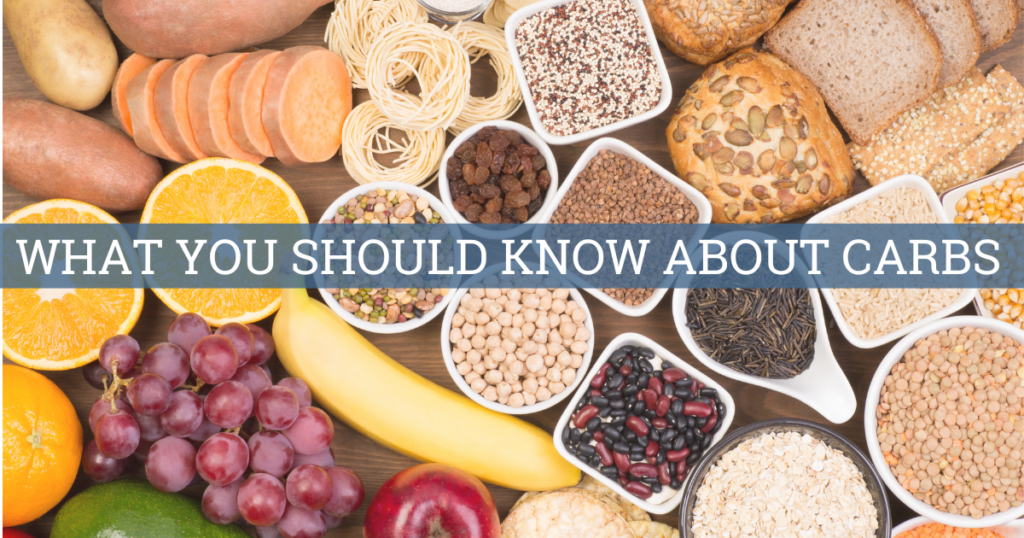The old adage “you are what you eat” is a great reminder that food choices matter. All foods aren’t created equal in terms of health value and how they affect your body. We require energy to live every single day, and we get that energy from the food we eat and drink. Carbohydrates are one of the most important sources of energy. Once your body uses up its storage of carbohydrates, it will turn to protein and fat for fuel.
We all know that carbs are important for our bodies. They provide energy and help us maintain a healthy weight by providing quick bursts of power when needed! With the rise of popular diets such as the ketogenic diet and other low carb programs, many individuals are depleting their bodies of the nutrients, vitamins, and minerals that carbohydrates provide. The key to maintaining health while trying to lose weight is to focus on choosing complex carbohydrates that make you feel full, instead of simple, refined carbohydrates that often leave you feeling hungry and tired.
So, let’s learn a little about carbohydrates and how to make the right choice when it comes to selecting which carbs you eat. Think of carbs as fuel that powers your body. You need them to make sugar for energy.
They come in two types: simple and complex, but what is the difference?
Simple carbs are like quick-burning fuels. They give you a quick boost in energy, but they also leave your system quickly, so shouldn’t be eaten too often or on an everyday basis because this is where we end up feeling stuffed from food that doesn’t really fill us up very much at all!
Whereas complex carbs pack in more nutrients than simple ones. They’re higher fiber and slower to digest, which makes them more filling so they can be an excellent choice for weight control!
You really need to read the fine print on nutrition labels when you are choosing which carbs are right for you. Nutrition labels offer a quick way to spot added sugar, which can be cut back on. If you see words that end in “ose” for example sucrose or fructose, then those are examples of simple carbs and should be avoided as much as possible because they will lead your body into glucose storage mode rather than fat burning mode!
It’s not that easy this day and age to just avoid simple carbs altogether. Simple carbs occur naturally in some foods that are part of a balanced diet. For example, most milk and other dairy products contain lactose, or milk sugar; making dairy a nutritional choice that should be done in moderation.
Fruit is also a healthy choice that tastes delicious! What’s better than a fresh peach or slice of watermelon in the summer months? While fruits like these have simple carbs, they also provide fiber to help slow the breakdown of sugar. Not only does this make for better digestive health over time thanks to its ability improve bowel movements- but you’re also getting all sorts of other benefits too like vitamin C and potassium.
Know what you’re drinking! Diet or not, some sodas contain hidden carbs that can stealthily spike your blood sugar levels. For example: non-diet drinks may use high fructose corn syrup as their sweetener and pack up to 39 grams per twelve ounce serving–all from just one bottle’s worth of sugary goodness. A lot people think they are eating healthier by cutting out certain types of food but then turning around and consuming loads more simple carbohydrates with what they are drinking.
Autumn is upon us, and the foods you associate with this season are rich in complex carbs. Starchy vegetables such as sweet potatoes or pumpkins can be a great source for those looking to maintain their health by eating more fiber-rich produce! Beans also offer up plenty of nutritional value and a good way to get complex carbs.
When you’re feeling guilty about wanting a sweet treat, just remember that popcorn is a whole grain and has fiber. And with so many varieties available today- including sweetened or kettle cooked toppings, it’s easy to find the best flavor for your sweet tooth. Even better, it can also be seasoned with your favorite dried herbs or spices for an extra kick in taste!
You might be wondering what grains are good for you to eat. Well, there’s a few that we recommend getting into the habit of eating regularly- quinoa from South America and other new generation whole grain choices such as millet or bulgur! If your taste buds crave something more traditional though, then try brown rice which is a whole grain and a good source of complex carbs.
To lose weight, it is still helpful to reduce any type of carbohydrate intake. But the best thing you can do for your body and waistline? Eat fiber-rich carbs earlier in the day when you are more active and will be able to expend the energy. These nutrients help keep blood sugar stable so that we experience fewer spikes in energy levels throughout our day.
The key is paying attention to what you eat, not just how much. And this will lead you on the path towards better health. Schedule your consultation today at Apollovh.com

